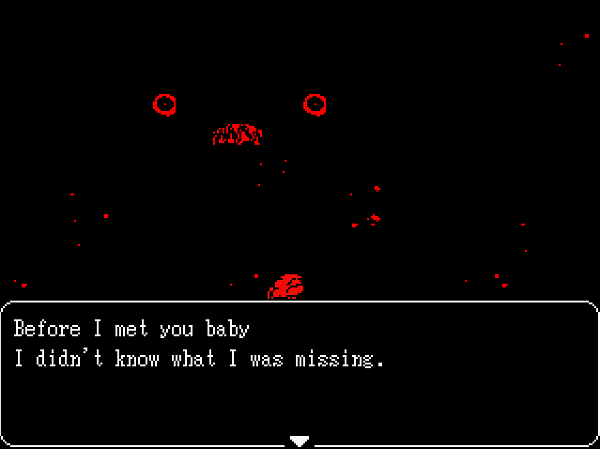The Games Of Christmas '10: Day 4
The fourth window on our advent calendar shimmers like a hallucination, giving off a smell of blood and the faint groan of distorted guitars. Is it even really there, or are we just scratching at the wall? No, wait, it's open now. What sordid madness is back there...
It's... Space Funeral!
Quinns: As usual, this year saw RPS playing whack-a-mole with hundreds of wonderful freeware indie games. How that works is that these games show up, frequently delivered to us by the talented individual who made them, and we have to post about them before they sink below the soil of our conscious memory.
But I couldn’t forget Space Funeral if I wanted to. This is a rare game. It’s stuck in my head like a neon splinter, and I’m the happier man for it. If I had to pick one freeware game of 2010 to receive a budget and be reimagined as a full-length title, Space Funeral would be it.
What is Space Funeral? Space Funeral is surreal, and that’s not an adjective so much as it is a categorisation. Space Funeral is surreal in the same sense that Mario Bros. is a platformer. You play Mario for the thrill of jumping across gaps and onto enemies. You play Space Funeral for the visit to the steak farm where steaks gambol and slouch around inside a holding pen, or for the bit where you pay a visit to a town called Malice, which has MANY GOODS and CRIMINALS.
And you do this to a soundtrack sourced entirely from amazing avant-garde music.
You play this game for its strangeness and humour, its characters and its dialogue, and that’s it. And yet despite having almost nothing going on mechanically, Space Funeral achieves a certain richness in its world- you’re rewarded with pleasant oddness for every single character you talk to, and almost every fight you have.
John was talking yesterday about Just Cause 2, and how he loved it whenever it wasn’t busy trying to be a game. There are loads of AAA games with this problem, games with interesting ideas which insist on wedging them between huge chunks of tried-and-tested game design. Another example from this year is Singularity. I wanted more time travel, mysteries, reveals and set-pieces, and I groaned out loud every time the game dissolved into another lengthy manshoot.
Space Funeral is rare because it never feels this need to be a game. It’s built in RPGMaker, but what it does is take the entire JRPG format, from towns and item shops to battles, and then treats it with the sort of workmanlike disdain you’d expect to see in a busy butcher. In the hands of Space Funeral, the enormous body of the JRPG is laid out, flipped over, comprehensively gutted, and then you and the game set sail in it. As much as Braid re-imagines the platformer or Portal the FPS, neither of them disembowel their genre quite as fiercely as Space Funeral. Braid and Portal apply their genius to making great games. Space Funeral doesn't, at all. It just wants to have fun.
Space Funeral has dungeons, but they’re amusingly short and largely ironic. There are battles, but they’re mostly a cakewalk. Space Funeral keeps only enough danger to keep you nervous (there is a game-over screen, and you’ll probably be seeing it), and then spends the rest of its time painting its ideas and dialogue onto the empty husk of the genre. And what ideas. What dialogue.
Your character is a twitching, shambling figure called Philip who never stops crying for the entire duration of the game. Rather than being cast out of town in the traditional JRPG style, Philip has been banished from his parents’ house for reasons unknown, still wearing his pyjamas. Some ways down the road you meet a horse with no head called Leg Horse, who’s on his way to the City of Forms. You decide to travel together, and on the way the pair of you end up riding a raft down Blood River, finding a grumpy genie in a penny mine, and even meeting Dracula.
It should be fairly obvious at this point that Space Funeral won’t be for everyone. If the game’s main menu (with its three options of BLOOD, BLOOD and BLOOD) doesn’t raise a smirk, you’re probably in for a slightly pointless 45 minutes. But I can’t help but see Space Funeral’s uncompromising tone as inspiring. Videogames have gotten into this habit of trying to please either casual gamers or hardcore gamers, with no distinction beyond that. It’s no good. A game, even a free one, that is developed under the knowledge that only a fraction of people will “get” it is an embarrassingly rare occurrence.
Wouldn’t it be nicer to live in a world where games don’t shy away from being as stupid, offensive, smart or strange as they please, and then go racing towards their target audience like hungry sharks? On the subject, I saw someone in the RPS comments the other day describing Space Funeral as a “hipster RPG”, which I guess I agree with. You’ve got the subtle grammar abuse, the ironic-bad MSPaint art and the sourcing of massively obscure music. Still, describing anything as a hipster game struck me as weird, because games don’t get marketed at hipsters. With the exception of games for kids and teenage girls, games don’t get marketed at anyone, nor do they get categorised as “for” anyone. They just get marketed, they’re just for “gamers”.
Space Funeral is rare because it is for someone. It’s for the hipster, the Achewood reader, or the lover of the surreal. And to the state the obvious, the territory of strangeness in videogames is still depressingly unmapped. For every The Void or Zeno Clash, or even every STALKER or Half-Life 2, we get a hundred games with reassuringly familiar fantasy or sci-fi settings. It’s a problem. Space Funeral isn’t just the weirdest game of 2010, it’s one of the weirdest games I’ve ever played.
Space Funeral is a rare game because it has quite a good ending.
Space Funeral is a rare game because it makes me laugh. A lot. In a year where gaming’s contained less surprises and more disappointments than usual, that’s very welcome indeed.







